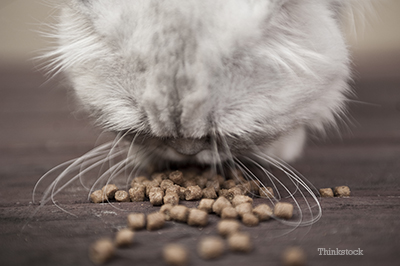
Just like other behaviors taken to extremes some cats eat excessive amounts. The scientific term for excess eating is polyphagia and refers to food intake beyond caloric needs. The usual impetus to eat is relatively simple. Hunger stimulates appetite centers in the brain.
Primary causes of polyphagia can be behavioral or psychogenic. Reduction of stress, associating food with pleasure, simply liking a particularly palatable food — all might initiate eating too much.
Failure to regulate the appetite centers because of a brain disorder is less common, but also possible. Some drugs can even directly stimulate the appetite centers of the brain.
Medical causes of polyphagia
Polyphagia can be caused by an increased metabolic rate, leading to a need for more calories. Metabolic rate could increase as a result of pregnancy and the need to produce milk for lactation, increased exercise demands or even cold temperatures.
Several diseases, which have been well discussed by Michigan Animal Hospital, include diabetes mellitus, excess thyroid levels (hyperthyroidism), and impaired digestion and absorption. They can all cause animals to not meet their caloric needs so they simply eat more.
Evaluating polyphagia
Evaluation of polyphagia necessitates first determining if the cat is gaining weight, losing weight or even just maintaining a steady weight. Remember to consider some drugs as a cause and discuss any medications with your veterinarian.
Diabetes and hyperthyroidism are often also associated with excess thirst (polydipsia) and excessive urination (polyuria.) Digestive tract diseases will frequently cause abnormalities of the stool and/or vomiting.
How can you diagnose the cause of polyphagia?
As with most conditions the first step is a thorough physical examination. Evaluation of complete blood count, serum chemistries, thyroid hormone, and urine may reveal the cause. Further tests may be necessary because these are often complex diseases. Intestinal abnormalities may require special laboratory tests, abdominal radiographs or ultrasound, and sometimes biopsies obtained either at surgery or using an intestinal endoscope.
How can polyphagia be managed or treated?
The treatment will depend on the underlying cause.
- If caused by a drug such as cortisone or some behavioral modifiers, you might be able to eliminate the drug.
- Diabetes can generally be managed using a combination of dietary control and insulin.
- Hyperthyroidism can be treated using radiation of the thyroid gland, surgical removal of the thyroid gland or drugs to reduce the production of thyroid hormone. Impaired digestion or absorption caused by gastrointestinal disease may be controlled using special diets and medications
I have tried to reduce my cat’s weight but he gets very unhappy. How can I control his obesity?
Psychogenic or behavioral polyphagia and secondary obesity as in other animals must be managed using a combination of increased exercise and decreased calorie intake using a calorie reduced diet as well as a change in feeding patterns.
Polyphagia is a sign of serious problems regardless of the cause. Obese cats are at increased risk for diabetes as well as other weight associated health problems.
See your veterinarian if your cat seems to be eating excessively or is overweight.
If you have any questions or concerns, you should always visit or call your veterinarian -- they are your best resource to ensure the health and well-being of your pets.
